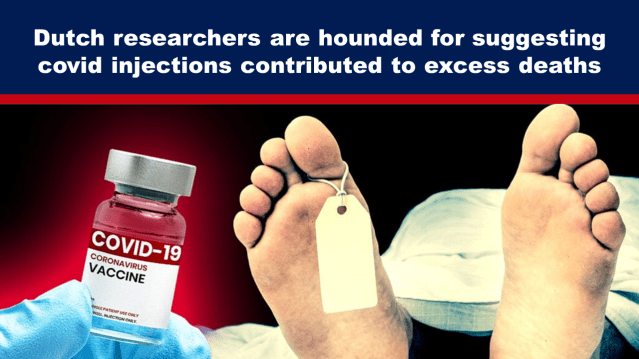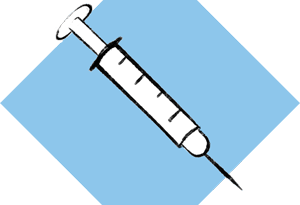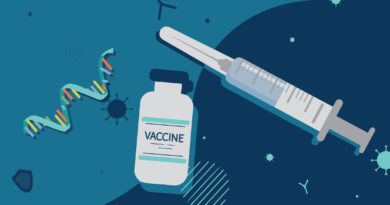Dutch researchers are hounded for suggesting covid injections contributed to excess deaths
A recent paper by Dutch researchers reviewed the excess mortality in the Western World for the years 2020 to 2022. The paper had been submitted a year ago but was only published last month.
Since it has been published, the authors have been subjected to coordinated attacks and requests for the paper to be withdrawn have been made by the usual “pharma shills” because it “wrongly inferred” covid injections contributed to excess deaths.
Putting these obvious silencing tactics to one side, Professors Norman Fenton and Martin Neil discuss the limitations of the paper in the manner that those who follow the scientific method should do.
Let’s not lose touch…Your Government and Big Tech are actively trying to censor the information reported by The Exposé to serve their own needs. Subscribe now to make sure you receive the latest uncensored news in your inbox…
Don’t dare to suggest covid vaccines may have contributed to excess deaths
By Professor Martin Neil and Professor Norman Fenton
A paper on excess mortality by Dutch researchers has recently been published in the British Medical Journal (BMJ Public Health).
[We have attached a copy of the paper below in the event it is withdrawn and is no longer available for public view.]
The fact that it actually got published in a reputable medical journal is surprising as it suggested – albeit ever so gently – that maybe, just maybe, the covid vaccines may have played a tincy wincy role in contributing to the recent excess deaths recorded across heavily vaccinated countries. Meanwhile, our own research and that of others, which has made much stronger claims about the lack of vaccine effectiveness, has been routinely censored and rejected from mainstream journals without review.
Of course, the paper has received, as expected, a lot of blowback from the usual pharma shills, demanding it be retracted, while its lead author Saskia Mostert’s home institute, The Princess Maxima Centre, even put out a grovelling statement distancing themselves from the research saying:
The Princess Maxima Centre deeply regrets that this publication might give the impression that the importance of vaccinations is being questioned.
The coordinated attacks against them have been comprehensively documented by Aussie17, read: ‘Medical Censorship Complex Targets BMJ Article for Retraction’.
Several people have asked us for our views about the paper. We believe there are several limitations worth discussing, but these significantly differ from the attacks by those trying to suppress all public knowledge of vaccine harms.
Although the paper has just been published it was actually submitted a year earlier in June 2023, so it only looks at excess deaths in 2020-2022 and only for “culturally Western countries” such as Europe, USA, Australia etc. The year 2023 would be more interesting as, unlike the period 2020-22, there have been almost no deaths classified as covid deaths, whilst the vaccination programme has continued.
The study uses the Our Word in Data database which in turn relies on various national systems that are not consistently accurate or have very different ways of reporting deaths.
The study uses the years 2015-19 as a baseline. This makes sense but it is extremely difficult and complex to take account of demographic changes in the models to compute excess deaths and there is no universally agreed method for doing this. This is why multiple studies on excess deaths provide very different results – some claiming much higher rates than in this study, and some others claiming lower. We have suggested better ways to determine whether the vaccines are safe and effective and, in particular, whether the vaccinated are more likely to die sooner than the unvaccinated as we set out HERE.
The paper accepts the narrative that the vaccinations have saved lives (maybe the authors needed to say this in order for it to be accepted) whereas we believe there is no evidence of a single life saved by the covid vaccination. As we have shown, all studies claiming vaccine effectiveness are systematically flawed and biased.
While the paper considers various explanations for excess deaths – covid, impact of lockdowns, missed serious disease diagnoses as well as vaccine adverse reactions, it fails to consider what we now believe were the major factors that explain the excess deaths in 2020, especially in the spring: cause of death misattribution, deaths resulting from inappropriate medical response to covid, such as use of ventilators, Do Not Resuscitate orders, midazolam and lack of antibiotics for bacterial pneumonia.
As we have reported in multiple articles on our Substack there is plenty of other independent evidence that vaccines have contributed to excess deaths and injuries. In addition to the many thousands of deaths reported in systems like VAERS and the Yellow Card, there are countries like Australia and the Philippines that never experienced significant covid mortality until the vaccine was introduced. We know in the UK there were spikes in all-cause mortality following vaccine rollout, and that there has been a massive increase in people claiming disability allowance following the vaccine rollout. But of course, it’s true none of these prove causation. One of the main criticisms of the Dutch paper was that it “wrongly inferred” that the vaccines contributed to excess deaths. In fact, the authors never even made this claim!
About the Authors
Norman Fenton is a Professor Emeritus of Risk Information Management at the Queen Mary University of London. He is also a Director of Agena, a company that specialises in risk management for critical systems. He is a mathematician by training whose current focus is on critical decision-making and, in particular, on quantifying uncertainty using causal, probabilistic models that combine data and knowledge (Bayesian networks). The approach can be summarized as “smart data rather than big data.”
Martin Neil is a renowned expert in the fields of Computer Science and Statistics. He is a full professor at Queen Mary, University of London, where he is also the Director of the UKRI Centre for Doctoral Training in Safe and Trusted AI. His research interests focus on Bayesian modelling and risk quantification in various areas, including artificial intelligence, machine learning, and data science.
Together, the two professors author a Substack page titled ‘Where Are the Numbers’.
Featured image: Covid Vaccines Linked to Increase in All-cause Mortality, Italian Study Shows, Children’s Health Defense, 6 July 2024




